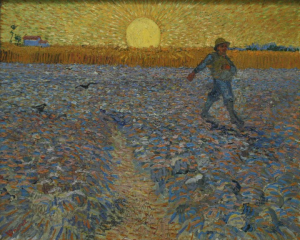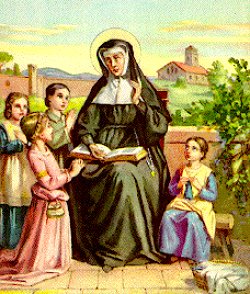HOMILY WEEK 03 03 – Year I
Soul Gardening: Living Word and Covenant Relationship:
Optional Memorial of St. Angela Merici
(Heb 10:11-18; Ps 110; Mk 4:1-20)
********************************************************
Gardening can, and should be, a spiritual experience. The liturgy today invites us to attend to the garden of our soul, where the living Word of God can bear the fruit of an intimate covenant relationship with God.
For years now, the activity involved in gardening – tilling the soil, root weeding and rake weeding, working in compost, planting seeds, watering the soil and above all, watching tiny inert seeds become transformed into living, life-giving plants, somehow nourishes a deep-seated need within my soul. The reality of the left-overs thrown away, put into the composting bin to decompose and be transformed into nutrients to enrich the soil, is a reminder to me of how God can turn all the negative realities of our lives, including our failings and sins, into something positive within the kingdom of God.
In the gospel today, Jesus relies on the metaphor of gardening to teach some important truths. But first, the letter to the Hebrews provides a background context. It speaks of a long-desired covenant relationship of God with us written not on stones or paper, but in the depths of our hearts and the recesses of our minds, one centered on such powerful forgiveness and the unconditional love of God, that ritualistic sacrifices are no longer necessary.
The gospel then moves us into the fields of Galilee, where Jesus, to teach the people the importance and significance of being attentive to the Word of God, speaks of sowing in four kinds of soil that can often be found all together. In fact, Fr. James Martin, in his book Jesus – A Pilgrim, excitedly shares his discover of a Bay of Parables where he is convinced Jesus wasn’t just speaking in generalities – he was describing the very conditions on that spot where James could literally see all four types of soil – hard path, rocky soil, thorn infested areas, and soft, fertile soil.
When the twelve apostles and others later questioned Jesus about this parable, Jesus very interestingly mentions something about the “secret of the kingdom of God” he was trying to communicate to them by means of that parable. That is an invitation to us to delve more deeply into both the first reading, and the gospel, to unearth the meaning of this “messianic secret” as it is referred to in especially the gospel of Mark.
What surfaces in the letter to the Hebrews is an intimate covenant relationship with God centered on God’s unconditional love expressed through forgiveness of our sins and focused on a “single sacrifice” of Christ. That single sacrifice, of course, was the selfless giving of his life on the cross where Jesus was crucified, all the while forgiving the very ones who were crucifying him. Two key elements of our salvation history were present on that cross – Jesus was atoning for the sins of all humanity, as well as, and above all, revealing the depths of the Father’s love for that humanity and all of God’s creation.
This is the secret of the kingdom of God – the vulnerability and brokenness of Jesus on the cross that was ultimately revealing who our God truly is. Now we can see right into the heart of God, and what we see is humility, mercy, compassion, forgiveness, unconditional love and total non-violence. That is not the kind of God the world expected nor even wants, addicted as it is to materialism, fame, power and control, which explains the difficulty so many even today have in accepting the reality of God in their lives.
 So, Jesus explains the parable to his disciples describing four classes of people in the world which I would describe as: Closed, Superficial, Distracted and Fertile. There are some who do not believe, who resist anything spiritual or religious – the hard path, Closed. Others have some interest, but are not committed and quickly lose interest – the rocky soil, Superficial. Still others initially get involved, but are easily caught up in all kinds of other pursuits and interests, so matters spiritual and religious drop to the bottom of their priorities – the thorn-infested soil, Distracted. But then there are some (hopefully we are among these) who are humble, painfully aware of their brokenness and personal need for God, open to receive the forgiveness and healing Jesus offers, attentive to the Word of God, learning to do God’s will and pray more contemplatively – the rich, Fertile soil that produces a hundredfold.
So, Jesus explains the parable to his disciples describing four classes of people in the world which I would describe as: Closed, Superficial, Distracted and Fertile. There are some who do not believe, who resist anything spiritual or religious – the hard path, Closed. Others have some interest, but are not committed and quickly lose interest – the rocky soil, Superficial. Still others initially get involved, but are easily caught up in all kinds of other pursuits and interests, so matters spiritual and religious drop to the bottom of their priorities – the thorn-infested soil, Distracted. But then there are some (hopefully we are among these) who are humble, painfully aware of their brokenness and personal need for God, open to receive the forgiveness and healing Jesus offers, attentive to the Word of God, learning to do God’s will and pray more contemplatively – the rich, Fertile soil that produces a hundredfold.
At the center of this mystery, this secret of the kingdom of God, is the unfathomable, totally gratuitous, unconditional love of God coming to us through forgiveness, uniquely expressed by the author of Hebrews as God forgetting our sins: “I will remember their sins and their lawless deeds no more.” In other passages, God declares our sins will be cast as far as the East is from the West, and that God will deal with our iniquity and not even remember it. When God does not remember our sins, they no longer exist, so why do we insist on remembering them and resisting that forgiveness?
One way we can move towards becoming richer soil open to the Word of God is to practice Lectio Divina – an ancient way of praying made up of four simple stages: Lectio – prayerfully reading a passage of scripture; Meditatio – meditating on that passage while asking ourselves what is God telling us through that word; Oratio – praying with the passage for the needs of the world and our own needs, and finally, Contemplatio – putting all thoughts and feelings aside and just being in God’s presence, aware we are in the presence of the Word made flesh, and soaking up God’s transformative love.

St Angela Merici
Today the church honors St. Angela Merici, recognized as the founder of the Ursulines, an order which has done much significant ministry in Western Canada. I have been privileged to collaborate with the Ursulines over the years, and to have had one as a spiritual director. When Angela became aware of the need for education for girls, she and several friends began to teach girls in their homes in the hope of improving social conditions. Angela inspired others in the work of education. In 1545, the Company of St. Ursula was officially recognized by Pope Paul III. She is a patron saint of orphans, the sick and the physically challenged.
The Eucharist brings this all together, as we focus on listening to God’s Word, then in communion receive God’s unconditional love as forgiveness and healing. May our celebration deepen our appreciation of the power of God’s Word and lead us into an ever more intimate relationship with our God who in Jesus revealed God’s self as unconditional love, as the Eucharist did for St. Angela Merici.



